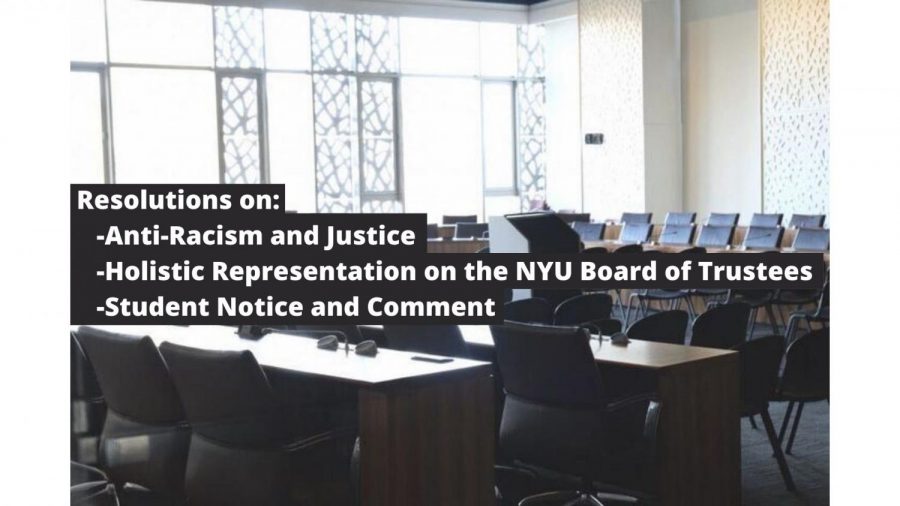SGA Chief of Staff Anthony Cruz co-proposed three resolutions: Resolution on Anti-Racism and Justice, Holistic Representation on the NYU Board of Trustees and Student Notice and Comment, which will be brought before the University Senate on April 22.
The Resolution on Anti-Racism and Justice
The Resolution on Anti-Racism and Justice proposes creating an “ad-hoc” Committee on Equity, Belonging, and Justice that would meet at least three times a semester. The committee would review current NYU policies — including those on the recruitment and retention of students and faculty — and publish recommendations on incorporating diverse perspectives into the review process. The committee would also be responsible for responding to instances of hate against marginalized communities at NYU.
The resolution was co-written by Reese Antoinette, who is the graduate senator for Tisch School of the Arts and director of diversity.
“I’m excited about this resolution and all that it represents,” Antoinette wrote in a statement delivered to the SGA by Cruz. “This is the work of diversity, equity and inclusion in a collaborative and impactful way … At a time when we are demanding that institutions incorporate representation into their infrastructure, this resolution provides a plan of action.”
The resolution acknowledges existing committees dedicated to anti-racism and justice education at NYU, such as the diversity, equity and inclusion committees of the two faculty senators councils.
“[The proposed committee] being ad hoc allows us to invite members that are not on the University Senate to sit on this committee,” Cruz said. “We would also hope to invite members of the Office of Global Inclusion, the LGBTQ+ Center, CMEP, NYU’s Metro Center and other offices and centers within NYU that are already conducting this work to propel their voice and experience forward to be on a university-wide level.”
“Anti-racism and justice work is usually … forced upon the BIPOC and/or LGBTQ+ members of the room that they’re in,” Cruz continued. “The labor to do this work is definitely overburdened without compensation for BIPOC members and LGBTQ+ members of our community.”
The Resolution on Holistic Representation on the NYU Board of Trustees
Cruz proposed the Resolution on Holistic Representation on the NYU Board of Trustees. This resolution recommends that the Board of Trustees add student senators, faculty, deans and administrative staff as voting members of the Board. It also asks the Board of Trustees to invite all members of various university committees to join board meetings as observers.
On April 13, 2017, the Tenured/Tenure-Track Faculty Senators Council voted in favor of a similar resolution, which requested the Board of Trustees add NYU faculty members to the Board’s voting council. The University Senate passed the resolution on March 29, 2018, but the Board of Trustees vetoed it shortly after. On July 24, 2018, William Berkley, the chairman of the Board of Trustees, and University President Andrew Hamilton wrote a letter to Wen Ling, then-chair of the Tenured/Tenure-Track Faculty Senators Council Executive Committee, outlining their reasons for denying the proposal.
“The Board’s longstanding view continues to be that each Trustee should bring a holistic outlook … rather than having members who are representative of specific stakeholder groups and their particular interests,” Hamilton and Berkley wrote.
“While we do want to have people who have a broad vision, we also want to have people who have a narrower scope in what they focus on and who they represent,” said CAS senator Paul Ibuzor, co-sponsor of the current representation resolution. “I think that both can coexist and I hope that the Board of Trustees would agree with me on that this time around.”
Berkley and Hamilton sent a second letter in 2018 to Hüsniye Çöğür, then-chair of the Executive Committee of the Student Senators Council, similarly explaining why they vetoed the SSC’s proposal to add one undergraduate and one graduate student to the Board of Trustees.
“The Board agrees more can be done to take account of the full range of student and faculty issues in our deliberations and to generally improve communications in both directions,” Berkley wrote in the letter.
Berkley and Hamilton continued to explain that the board would dedicate time each year to meet with executive committees representing students, faculty and staff. The current SGA resolution recognizes the Board’s goal of cooperation with student government, but deems it “inefficient” in representing student and faculty needs.
“Students themselves have the tremendous ability to be able to have impact in the spaces that they’re in,” Cruz said. “But when access to those spaces is not granted, then students can’t do the work that we’re supposed to be doing.”
Ibuzor told WSN that this resolution intentionally left out specific demands in order to allow the Board of Trustees more flexibility that was not present in previous, overturned resolutions.
The Resolution on Student Notice and Comment
Finally, the Resolution on Student Notice and Comment intends to give students a chance to respond to proposed university policy changes. Examples outlined in the proposal include faculty hiring decisions, budget alterations and changes to course registration. Student government members in each school will send students a survey for potential decisions in the future. After comments are closed, student government members will compile a summary of student responses to return to NYU administration for review.
The resolution was co-drafted by Adam George, a student representative for NYU Law, and other members of the NYU Law Student Bar Association. Daphne Fong, another NYU Law student representative, told WSN that SGA spent the past summer understanding how the COVID-19 pandemic could affect the law school’s tuition, class structure and spring breaks. The lack of communication between their student government and the NYU administration revealed a clear need for a policy that would keep students apprised of decisions that have the potential to seriously affect them.
At the beginning of the pandemic, Fong described a survey sent out to all NYU Law students about the school’s grading policy. Over 1,400 students responded with their thoughts on pass/fail policies and the mental and physical stress they were under.
“[The university was able to] get individual responses that tell you, ‘Our students are hurting and they need something,’” Fong said. “And that was very effective. That led to a fundamental change in the grading policy last spring.”
George speculated that the NYU administration may want to trial their proposal before committing to the work this resolution requires. If it is successful, he told WSN it could revolutionize the way universities represent their students.
“It reflects a hope on the part of students,” George said. “A hope that we can really change the way universities make decisions and recognize that students are very frequently the main recipients of these decisions.”
The University Senate will discuss and vote on each of these resolutions at their final meeting of the 2021-22 academic year on April 22. If passed, the resolutions will be sent to the Board of Trustees for final approval.
A version of this article appeared in the Monday, April 12, 2021, e-print edition. Email Kayla Hardersen at [email protected].
























































































































































